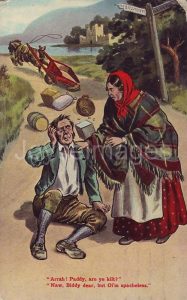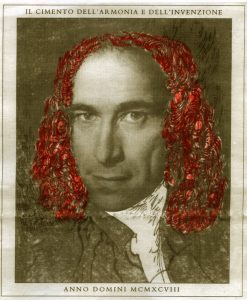Anyone who researches nineteenth-century Irish families quickly becomes aware of what is unspoken behind many records. Despite the fact that the Irish language, Gaelic, was the majority tongue in many areas until well past the middle of the century, not one state or church record writes down a single word of Irish.

Think about what that meant for the people being recorded: the language in which they lived their lives was utterly worthless to the bosthoons and looderamauns running official Ireland. No wonder so many made the stark choice to abandon Irish in order to survive.
The implications for research are unavoidable. Imagine that baptismal record from the 1830s as it must have seemed to the parents. Their names are being written down, often phonetically, sometimes (mis-)translated, in a language they don’t understand and which they almost certainly couldn’t read even if they did understand it. You may care how your surname is spelt. Your ancestors certainly didn’t.
One result is that the slow evolution of names out of Irish and into English happens before your eyes. In West Cork Catholic baptismal registers, the many Fowlues (from Ó Foghlú, derived from foghlaí, meaning ‘robber’) transmute decade by decade into the contemporary English ‘Foley’. In other cases, the changes are dizzyingly abrupt. In North Mayo, I’ve seen the first children of a family baptised as Mulderrig (Ó Maoildeirg,

‘grandson of the red(-haired) priest’, with the younger ones all ‘Reddington’, a common attempt to shoehorn the colour red into a perfectly respectable but completely different surname from the north of England. The Leitrim surname Breheny (from Bhreithiúnach, meaning ‘lawyer’ or ‘judge’) starts off in the 1830s as Breheny, becomes ‘Abraham’ and ends up’ Judge’.
Another shadow language is also there. We didn’t just take on the English language. We took it on and banjaxed it. Hiberno-English is a wonderful stew of Gaelic and medieval English, flavoured with intense local accents. If you’re wondering why you can’t find your Deane ancestors, that’s because they’re in the records as ‘Dain’ (‘Cup of tay, anyone?’). Likewise with Geaney (‘Ganey’).
And all your Grenhams are Grinhams.
Well my Keanes were certainly Kane/Kaine
Thanks for this information. It explains so much. My Garrity ancestors appear to have so many spellings.
The Gaelic League sis a lovely job on rebanjaxing by reversing it all – they INSISTED our name was McCarthy, ignoring the fact we have landlords records of us as Ó Cárthaigh – still, that got me dad off an assault charge when he was a young bould fellah
I spent years trying to track details for my grandmother who her daughters assured me was called “Quinneen”. I eventually found that she was a Roberts – aka Cunneen, or coinín – Anglicised to “rabbit” or “Roberts”. Now try saying coinín in a strong rural south Limerick accent and you can hear it as Quinneen alright. I only discovered this because of a mistake in the filling out of the 1901 census form. The transcription was “Roberts”, but the image showed “Cunneen” written down first, then crossed out.
Well, that bunny rabbit made quite a leap! From Cunneen or Quinneen (coinín) to …. ROBERTS!
Hmmm…I have an ancestor whose name on her NYC death certificate was Ann “Quinnan”, but when tracked down in Ireland, her last name turned out to be “Coonane/Coonan/Conane” (northern County Tipperary). She had a son, Edward, with the middle name of Robertson, but that name doesn’t appear anywhere else in the family tree and I’ve always been puzzled by it. Do you think this be the same thing, Robertson = Coonane = Rabbit? So interesting.
I found 19 different spellings for Hennessy in parish and Census records
Is that all? ; )
My favourite (so far) is Culreavy to Grey. One of the women in my research is recorded alternately as Culreavy or Grey on the baptisms of her children – sometimes by the same priest.
And today I came across an actual example to the occurrence mentioned by MacLysaght, namely Cronogue to Crowley – a woman recorded as Cronogue in the 1901/1911 censuses recorded as Crowley on the birth registrations of her children
And then when you add records written in Latin into the mix. I am never sure how translate back into English names like JACOBUS which can either be James or Jacob.
Thanks for the further information on my surname. I hadn’t seen that before.
The Robber
I have Mayclims mixed in with Meaklims. A Robert Mayclim got married to Ann Finlay in 1874 & 2 years later, they had a son John Meaklim & Robert’s name was also changed in the record!
John: what about those old Gaels who came so early they were pre-surname, then took surnames that could not possibly be theirs by birthright. On a Dal gcais Family Tree project haplotype page coming down from DC63 which is early under L226, though there are not that many total entries in all, a portion of those that do exist have Norman surnames, and not even the same Norman name! My brother is among them. Curtis. Any thoughts about how those surnames might have evolved?
During a course of study I was interested to discover that following the arrival of British and French settlers to North America, the third most widely spoken language was Gealic. The people settled in Nova Scotia apparently continue to speak a derivation of Gealic from different sources.
Many people of the US are clearly aware of the history of US media and the way in which minority languages have been excluded from movies. More important I would say is the loss of the skills and crafts of Mountain Men and the languages used.
I was doing some research on an Ahern family a few years ago and even within the same generation they all had different variations on the surname. One of those names that nobody can agree on the correct spelling
I’m a relative newbie when it comes to researching my Irish roots. This post has been very helpful! On the other hand, my first thought was OMG! This is going to be harder than I thought!!
Just to echo what a nother poster mentioend, the Latinizing of names drives me crazy. I can figure out Patriclus, and eventually managed Johannes. But, Robertus? Seriously?